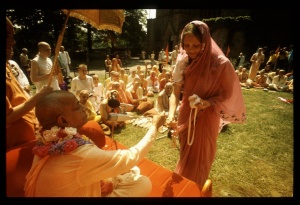CC Madhya 7.99 (1975): Difference between revisions
(Vanibot #0027: CCMirror - Mirror CC's 1996 edition to form a basis for 1975) |
(Vanibot #0020: VersionCompareLinker - added a link to the Version Compare feature) |
||
| Line 2: | Line 2: | ||
<div style="float:left">'''[[Sri Caitanya-caritamrta (1975)|Śrī Caitanya-caritāmṛta (1975)]] - [[CC Madhya (1975)|Madhya-līlā]] - [[CC Madhya 7 (1975)|Chapter 7: The Lord Begins His Tour of South India]]'''</div> | <div style="float:left">'''[[Sri Caitanya-caritamrta (1975)|Śrī Caitanya-caritāmṛta (1975)]] - [[CC Madhya (1975)|Madhya-līlā]] - [[CC Madhya 7 (1975)|Chapter 7: The Lord Begins His Tour of South India]]'''</div> | ||
<div style="float:right">[[File:Go-previous.png|link=CC Madhya 7.98 (1975)|Madhya-līlā 7.98]] '''[[CC Madhya 7.98 (1975)|Madhya-līlā 7.98]] - [[CC Madhya 7.100 (1975)|Madhya-līlā 7.100]]''' [[File:Go-next.png|link=CC Madhya 7.100 (1975)|Madhya-līlā 7.100]]</div> | <div style="float:right">[[File:Go-previous.png|link=CC Madhya 7.98 (1975)|Madhya-līlā 7.98]] '''[[CC Madhya 7.98 (1975)|Madhya-līlā 7.98]] - [[CC Madhya 7.100 (1975)|Madhya-līlā 7.100]]''' [[File:Go-next.png|link=CC Madhya 7.100 (1975)|Madhya-līlā 7.100]]</div> | ||
{{CompareVersions|CC|Madhya 7.99|CC 1975|CC 1996}} | |||
{{RandomImage}} | {{RandomImage}} | ||
==== TEXT 99 ==== | ==== TEXT 99 ==== | ||
<div class="verse"> | <div class="verse"> | ||
:kata-kṣaṇe | :kata-kṣaṇe rahi' prabhu tāre āliṅgiyā | ||
:vidāya karila tāre śakti sañcāriyā | :vidāya karila tāre śakti sañcāriyā | ||
</div> | </div> | ||
| Line 18: | Line 17: | ||
<div class="synonyms"> | <div class="synonyms"> | ||
kata-kṣaṇe | kata-kṣaṇe rahi'-after remaining for some time; prabhu—Lord Śrī Caitanya Mahāprabhu; tāre—them; āliṅgiyā—embracing; vidāya karila—bade farewell; tāre—in them; śakti—spiritual potency; sañcāriyā—investing. | ||
</div> | </div> | ||
| Line 25: | Line 24: | ||
<div class="translation"> | <div class="translation"> | ||
After some time the Lord would embrace these people and bid them return home, having | After some time the Lord would embrace these people and bid them to return home, having investing them with spiritual potency. | ||
</div> | </div> | ||
| Line 32: | Line 31: | ||
<div class="purport"> | <div class="purport"> | ||
In his Amṛta-pravāha-bhāṣya, Śrīla Bhaktivinoda Ṭhākura explains that this spiritual potency is the essence of the pleasure potency and the knowledge potency. By these two potencies, one is empowered with devotional service. Lord Kṛṣṇa Himself or His representative, the unalloyed devotee, can mercifully bestow these combined potencies upon any man. Being thus endowed with such potencies, one can become an unalloyed devotee of the Lord. Anyone favored by Lord Śrī Caitanya Mahāprabhu was empowered with this bhakti-śakti. Thus the | In his Amṛta-pravāha-bhāṣya, Śrīla Bhaktivinoda Ṭhākura explains that this spiritual potency is the essence of the pleasure potency and the knowledge potency. By these two potencies, one is empowered with devotional service. Lord Kṛṣṇa Himself or His representative, the unalloyed devotee, can mercifully bestow these combined potencies upon any man. Being thus endowed with such potencies, one can become an unalloyed devotee of the Lord. Anyone favored by Lord Śrī Caitanya Mahāprabhu was empowered with this bhakti-śakti. Thus the Lord's followers were able to preach Kṛṣṇa consciousness by divine grace. | ||
</div> | </div> | ||
Latest revision as of 19:38, 27 January 2020

A.C. Bhaktivedanta Swami Prabhupada
TEXT 99
- kata-kṣaṇe rahi' prabhu tāre āliṅgiyā
- vidāya karila tāre śakti sañcāriyā
SYNONYMS
kata-kṣaṇe rahi'-after remaining for some time; prabhu—Lord Śrī Caitanya Mahāprabhu; tāre—them; āliṅgiyā—embracing; vidāya karila—bade farewell; tāre—in them; śakti—spiritual potency; sañcāriyā—investing.
TRANSLATION
After some time the Lord would embrace these people and bid them to return home, having investing them with spiritual potency.
PURPORT
In his Amṛta-pravāha-bhāṣya, Śrīla Bhaktivinoda Ṭhākura explains that this spiritual potency is the essence of the pleasure potency and the knowledge potency. By these two potencies, one is empowered with devotional service. Lord Kṛṣṇa Himself or His representative, the unalloyed devotee, can mercifully bestow these combined potencies upon any man. Being thus endowed with such potencies, one can become an unalloyed devotee of the Lord. Anyone favored by Lord Śrī Caitanya Mahāprabhu was empowered with this bhakti-śakti. Thus the Lord's followers were able to preach Kṛṣṇa consciousness by divine grace.